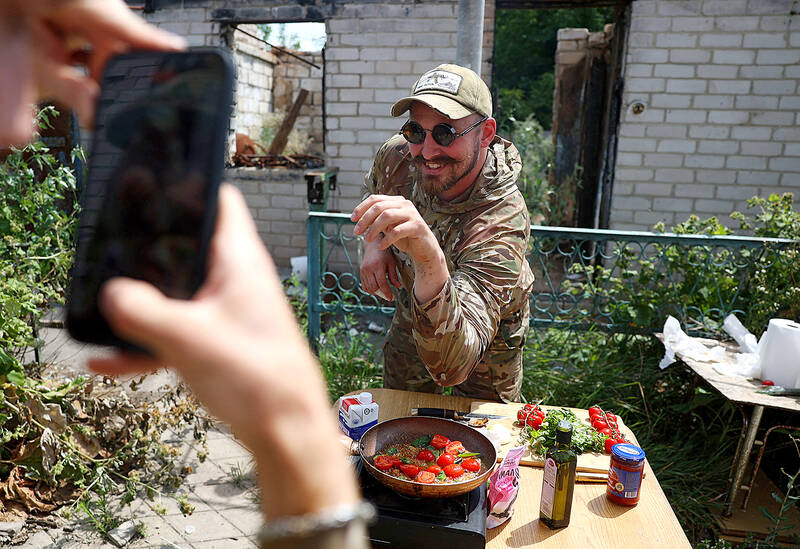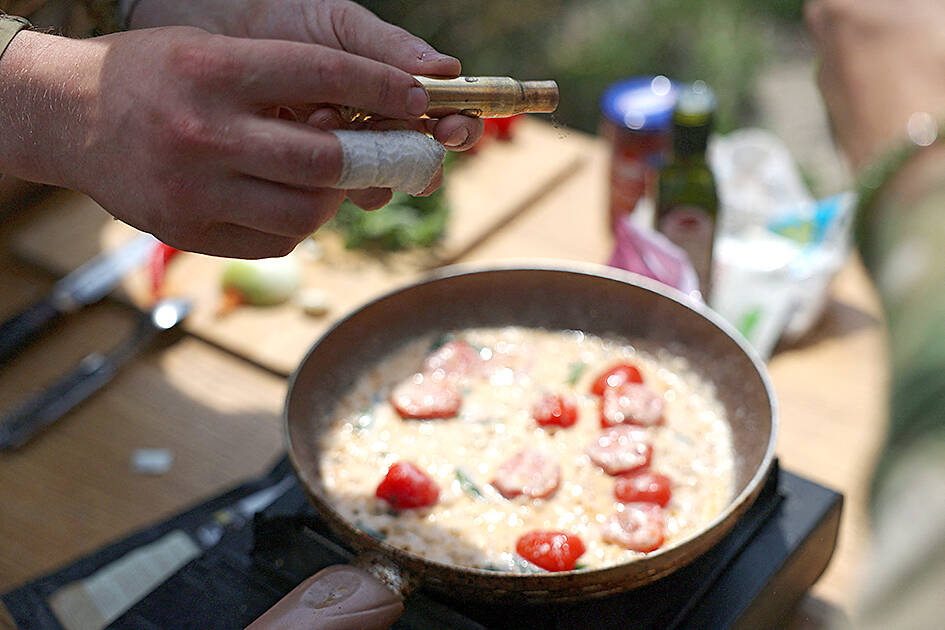Standing amid ruins in east Ukraine, Ruslan Mokrytskyi held a combat knife and concentrated on cutting onions without crying. As trivial as it seems on the front line, it is still not easy.
The mustachioed 32-year-old in military fatigues instructed his comrade to get the right shot of him with his phone. The angle matters. Mokrytskyi is one of Ukraine’s soldier-influencers keeping up spirits in times of war and has 131,600 followers on TikTok.
“Take a close-up of my fingers,” he told his friend, a cameraman for the day. “Lower the frame.”

Photo: AFP
The shot showed his shrapnel-scarred hands as he peeled the onions carefully.
Mokrytskyi’s social media profile describes his life as a part-time celebrity chef and soldier in a nutshell: “A cook from the hell of war.” The day this reporter met him, he revisited an Italian classic, pasta all’arrabbiata.
Just 24 hours earlier, he was a drone pilot in what he called the “hell of Toretsk” — defending the eastern city that Russia has been trying to capture for months.

Photo: AFP
MENTAL RECUPERATION
At the front since the start of the war in 2022, Mokrytskyi needed a form of escape while being under constant fire.
“After missions, there were, let’s say ... many horrible and stressful images,” he said. “I needed to recuperate mentally.”
He tried to forget the horrors by plunging into films, music, reading and going on walks despite the bombs. But nothing worked.
“I got to the point where I told myself that it would be cool to film myself making fries,” the soldier said.
The success of that idea exceeded his expectations: his fries video got three million views. Encouraged, Mokrytskyi involved friends from his battalion, who would call their wives to get ideas for recipes. He then realized he was not only helping his own mental health but that of his comrades too.
“Everyone was joking around,” he said. “It’s not just me rebuilding myself mentally, but also everyone around me.”
His video sessions offer “an hour or two” of light-heartedness — an unusual feeling on the front in Donbas, where fighting has been incessant for two and half years since Moscow invaded.
His fellow battalion member Ivan played with the camera and looked delighted with the uplifting break from war. Normally, Ivan’s nights are restless.
“When I film Ruslan, I don’t think about the war,” the 25-year-old said, adding that he also gets the extra bonus of a good meal while helping make the videos.
On his TikTok page, Mokrytskyi’s content alternates between cooking recipes and raw images showing the realities of war. On top of having “vital” psychological benefits, running the social media page means the soldier retains a link with civilian life. It also allows civilians as well as his family — to keep informed on what a soldier’s life is like in the east.
Mokrytskyi said that “if you do not have contact with your family, you can go mad.”
UNDERMINING ENEMY STEREOTYPES
He strives to make the content entertaining but war-related, like converting a rifle cartridge into a pepper shaker and using products found in destroyed cities he travels through.
Now a recognizable face, some businesses are getting interested in Mokrytskyi.
“An energy drinks company approached me,” he said, to make him a brand ambassador. “They sent packs of drinks and helped me when I was wounded,” he added, his hands still bearing the scars.
He initially got generous donations from civilians but, after two and a half years of war, those have dried up. Yet he knows his videos help keep up Ukrainian spirits — and even may be helping undermine the enemy’s stereotypes.
“The Russians also watch my videos,” he said with a smile. “They see that we are ordinary people defending their country, and not fascists or I don’t know what else,” he said, referring to Moscow’s portrayal of Ukraine.
This in part motivates him running his channel, despite his very demanding obligations as a soldier. When a friend was killed it took him “four days to get back my spirits” but then he went back to making videos.
Back on his cooking spree, the aroma of hot parmesan was rising above the ruins and Mokrytskyi emptied the pasta onto the plastic plates of his comrades.
Smiles lit up their faces.

In the March 9 edition of the Taipei Times a piece by Ninon Godefroy ran with the headine “The quiet, gentle rhythm of Taiwan.” It started with the line “Taiwan is a small, humble place. There is no Eiffel Tower, no pyramids — no singular attraction that draws the world’s attention.” I laughed out loud at that. This was out of no disrespect for the author or the piece, which made some interesting analogies and good points about how both Din Tai Fung’s and Taiwan Semiconductor Manufacturing Co’s (TSMC, 台積電) meticulous attention to detail and quality are not quite up to

April 21 to April 27 Hsieh Er’s (謝娥) political fortunes were rising fast after she got out of jail and joined the Chinese Nationalist Party (KMT) in December 1945. Not only did she hold key positions in various committees, she was elected the only woman on the Taipei City Council and headed to Nanjing in 1946 as the sole Taiwanese female representative to the National Constituent Assembly. With the support of first lady Soong May-ling (宋美齡), she started the Taipei Women’s Association and Taiwan Provincial Women’s Association, where she

Chinese Nationalist Party (KMT) Chairman Eric Chu (朱立倫) hatched a bold plan to charge forward and seize the initiative when he held a protest in front of the Taipei City Prosecutors’ Office. Though risky, because illegal, its success would help tackle at least six problems facing both himself and the KMT. What he did not see coming was Taipei Mayor Chiang Wan-an (將萬安) tripping him up out of the gate. In spite of Chu being the most consequential and successful KMT chairman since the early 2010s — arguably saving the party from financial ruin and restoring its electoral viability —

It is one of the more remarkable facts of Taiwan history that it was never occupied or claimed by any of the numerous kingdoms of southern China — Han or otherwise — that lay just across the water from it. None of their brilliant ministers ever discovered that Taiwan was a “core interest” of the state whose annexation was “inevitable.” As Paul Kua notes in an excellent monograph laying out how the Portuguese gave Taiwan the name “Formosa,” the first Europeans to express an interest in occupying Taiwan were the Spanish. Tonio Andrade in his seminal work, How Taiwan Became Chinese,